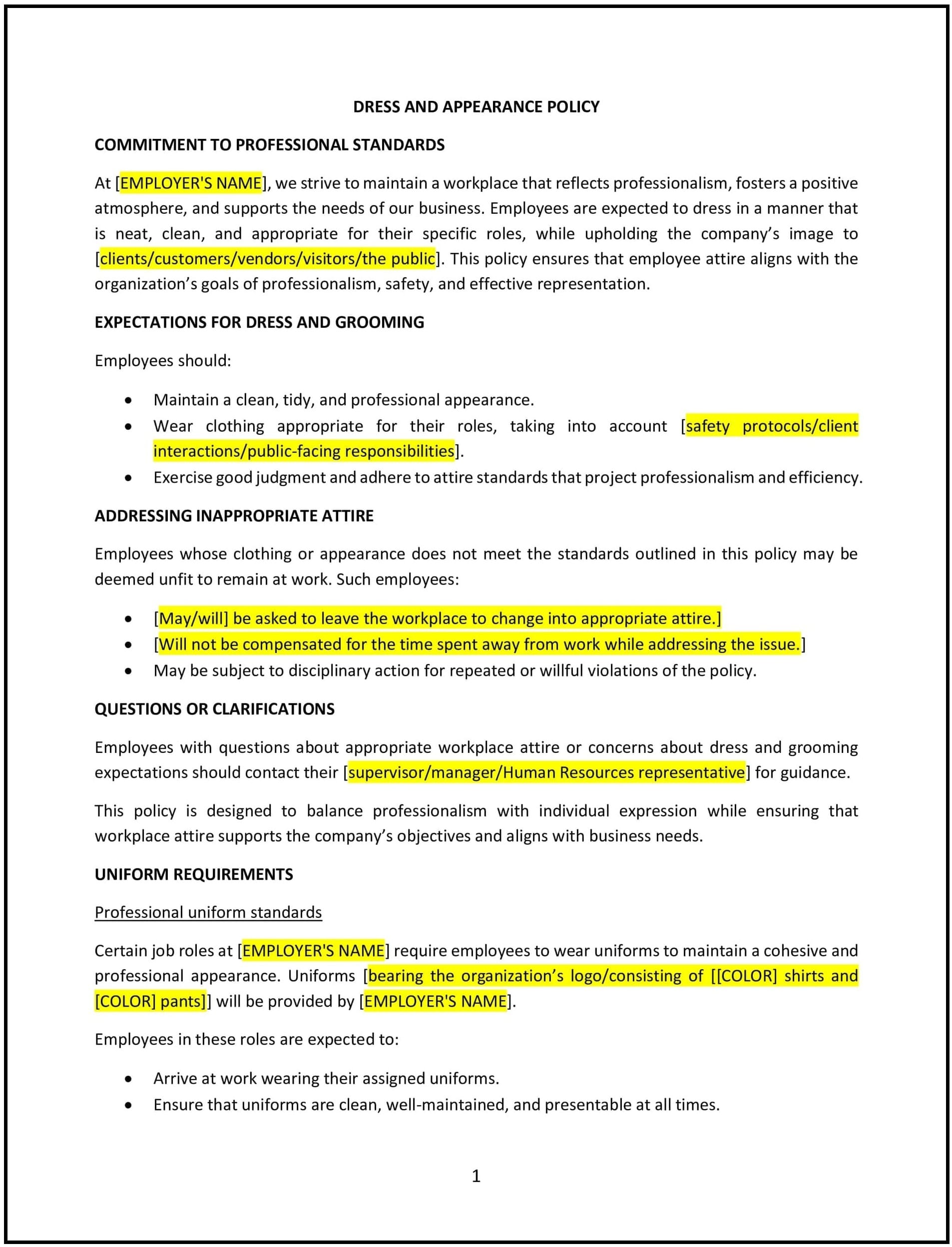Dress and appearance (New Jersey) policy: Free template
Got contracts to review? While you're here for policies, let Cobrief make contract review effortless—start your free review now.

Customize this template for free
Dress and appearance (New Jersey)
A dress and appearance policy helps New Jersey businesses establish clear expectations for workplace attire while allowing flexibility for industry norms, job roles, and company culture. This policy outlines appropriate dress codes, personal grooming standards, and accommodations for religious or cultural attire. It also provides guidance on professional appearance while respecting employees’ individual preferences.
By adopting this policy, businesses in New Jersey can promote a professional work environment while maintaining comfort and inclusivity for employees.
How to use this dress and appearance policy (New Jersey)
- Define dress code expectations: Specify whether the workplace follows a formal, business casual, or casual dress code, depending on industry and job roles.
- Outline acceptable workplace attire: Provide examples of appropriate clothing, such as collared shirts, blouses, slacks, dresses, and professional footwear.
- Address safety-related dress requirements: Require employees in certain roles, such as manufacturing or healthcare, to wear personal protective equipment (PPE) or job-specific uniforms.
- Allow flexibility for cultural and religious attire: Encourage inclusivity by permitting religious head coverings, cultural garments, and reasonable dress accommodations.
- Establish grooming and hygiene standards: Emphasize the importance of maintaining cleanliness, professional grooming, and appropriate hairstyles based on workplace needs.
- Prohibit inappropriate clothing: Define attire that is not suitable for work, such as overly revealing clothing, offensive slogans, or items that pose safety risks.
- Provide dress code exceptions: Allow relaxed dress on specific days, such as casual Fridays, team events, or remote work arrangements.
- Review and update: Regularly assess the policy to reflect evolving workplace culture, industry norms, and employee feedback.
Benefits of using this dress and appearance policy (New Jersey)
This policy provides several benefits for New Jersey businesses:
- Promotes professionalism: Establishes clear standards for workplace appearance, fostering a positive business image.
- Enhances workplace safety: Ensures employees in specialized roles wear appropriate safety gear or uniforms.
- Encourages inclusivity: Supports accommodations for religious, cultural, and personal expression in workplace attire.
- Reduces dress code misunderstandings: Provides clear guidelines to prevent confusion about appropriate attire.
- Aligns with company branding: Reinforces a consistent and professional appearance for customer-facing roles.
Tips for using this dress and appearance policy (New Jersey)
- Communicate the policy clearly: Ensure employees understand dress code expectations through handbooks, onboarding materials, and workplace signage.
- Allow flexibility when possible: Adjust dress code guidelines to accommodate remote work, industry norms, or special occasions.
- Address concerns respectfully: Encourage open discussions about accommodations for religious, cultural, or personal dress preferences.
- Train managers on policy enforcement: Provide guidance on addressing dress code violations consistently and professionally.
- Review the policy regularly: Update the policy based on industry trends, employee feedback, and workplace culture shifts.